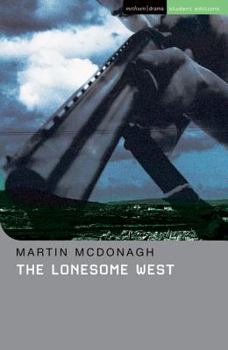The Lonesome West
(Book #3 in the The Leenane Trilogy Series)
This Student Edition features expert and helpful annotation, including a scene-by-scene summary, a detailed commentary on the dramatic, social and political context, and on the themes, characters, language and structure of the play, as well a list of suggested reading and questions for further study and a review of performance history. The Lonesome West was first presented as a Druid Theatre company and Royal Court co-production in the summer of 1997, and is the final part of McDonagh's Leenane trilogy. This edition explores the play's substantial themes and textured controversy, which make it such a popular choice to study: the Catholic Church is exposed as irrelevant and powerless and the characters have a dangerously skewed sense of morality. The text is full of McDonagh's characteristic combination of farce, aggression and wit. The plot follows two brothers, Valene and Coleman, living alone in their father's house after his recent death. They find it impossible to exist without massive and violent disputes over the most mundane and innocent of topics. Only Father Welsh, the local young priest, is prepared to try to reconcile the two before their petty squabblings spiral into vicious and bloody carnage. Martin McDonagh is the most controversial Irish dramatist working today, with his explorations of Irish national identity which look at the darker side of provincial life. His bleak but blackly comic portrayal of modern, rural Ireland courts debate with its dark farce, caricatures of violence and barbarism and an exaggerated, poeticised dialect of Hiberno-English.
Format:Paperback
Language:English
ISBN:1408125765
ISBN13:9781408125762
Release Date:November 2010
Publisher:Methuen Drama
Length:160 Pages
Weight:0.31 lbs.
Dimensions:0.6" x 5.0" x 7.6"
Customer Reviews
1 rating
McDonagh Taps the Absurist Tradition
Published by Thriftbooks.com User , 15 years ago
"The Lonesome West" is early Martin McDonagh about the forlorn west of Ireland where according to the author the inhabitants tend to be isolated, insular, slow-witted, barely civilized, violent, and dangerously unneighborly. Remember hearing about the theater of the absurd, the theater of the ridiculous and the theater of cruelty? Here we see it taking on a new life and veering off in a loony, kookie, and gory direction. "In Bruges" shows you later but barely less than barbaric McDonagh. Frequent outbreaks of black comedy, burlesque, farce, and shock and awe emerge. His characters are drinking the local hootch--poteen. None of the play's inmates can remember whether the local priest is Father Walsh or Welsh, but spiritually he's of no consequence anyway. The only bright lights in McDonagh's plays seem to be good-looking, quite young local lasses who are fiercely independent and don't mind killing things. The priest has a crisis of faith (did he have any to begin with?) and a tendency to drink too much. McDonagh seems to feed on Irish stereotypes. Two brothers, both dimwits, living together are constantly feuding. One brother has offed his old man for a trivial slight. The other brother keeps silent about it but only because his sibling has signed all the family property over to him. They are screwball characters: two of the three stooges, Abbot and Costello, Laurel and Hardy in their dialogue riffs. You're on a merry-go-round of illogical talk absurdist dialogue. The brothers in this play fight over nonsensical stuff, partly because both are dumbbells. What is the meaning of it all? It's like Pinter's Homecoming but more violent and goofy, but with less significance and artistry. Pinter digs deeper, is a bottom fisher: McDonagh feeds closer to the surface. The younger brother, Coleman, is flippant, irreverent toward the priest. The characters in general are impious, disrespectful with an irreligious attitude toward faith. Between the brothers, Coleman and Valene, there's pent-up violence. It's a village with a sick group of inhabitants. Cats have more value than people. People in a McDonagh play apologize, but they never really mean it. Right after a faux apology they throw more fat on the fire in an orgy of self-destruction. Bad facts and secrets come out in the dialogue. The brothers give a litany of bad, hateful stuff they've done to each other which increases their mutual hatred for each other. Brothers in a McDonagh play like the brothers in "Pillowman" seem to deliberately destroy their own kin by their actions. There is violence and cruelty as nasty people take revenge. Should we worry about these numbskulls, even feel concerned? It's such fun to watch them going at it. And isn't that McDonagh's purpose making us laugh and feel uneasy all at the same time?





